人教版高一英语必修三 Unit1 Festivals around the world Grammar 情态动词 课件(共17张PPT)
文档属性
| 名称 | 人教版高一英语必修三 Unit1 Festivals around the world Grammar 情态动词 课件(共17张PPT) |
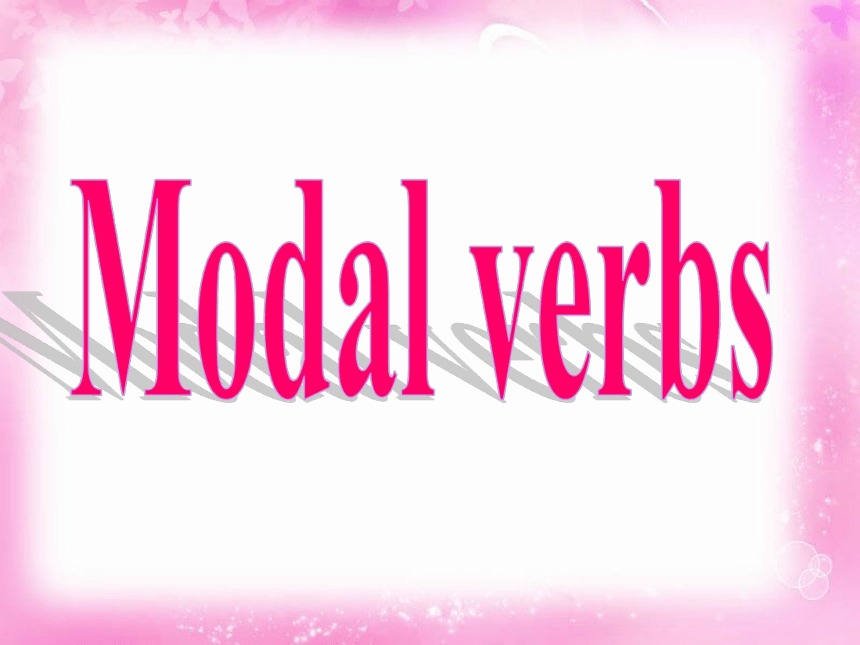
|
|
| 格式 | ppt | ||
| 文件大小 | 509.5KB | ||
| 资源类型 | 教案 | ||
| 版本资源 | 人教版(新课程标准) | ||
| 科目 | 英语 | ||
| 更新时间 | 2020-10-03 00:00:00 | ||
图片预览


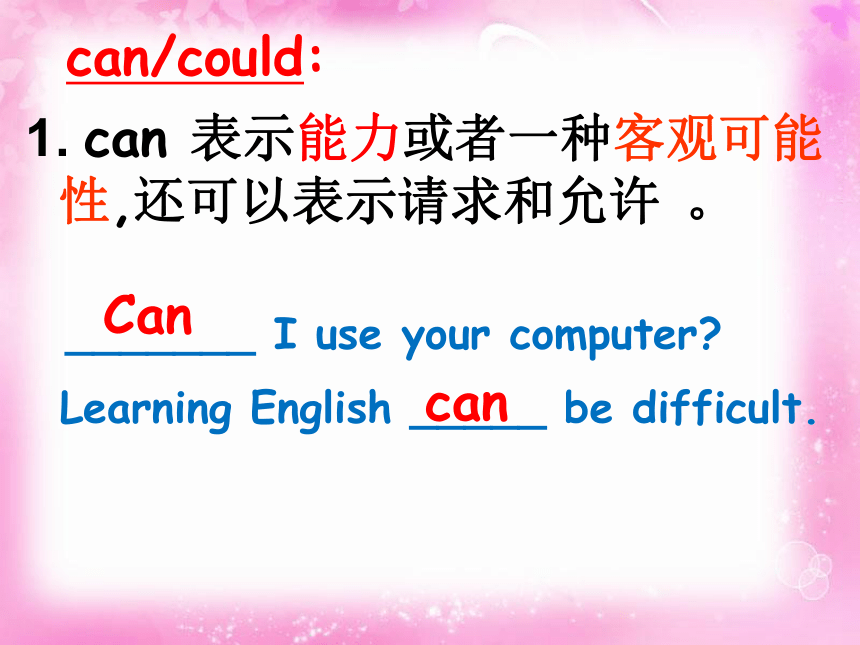
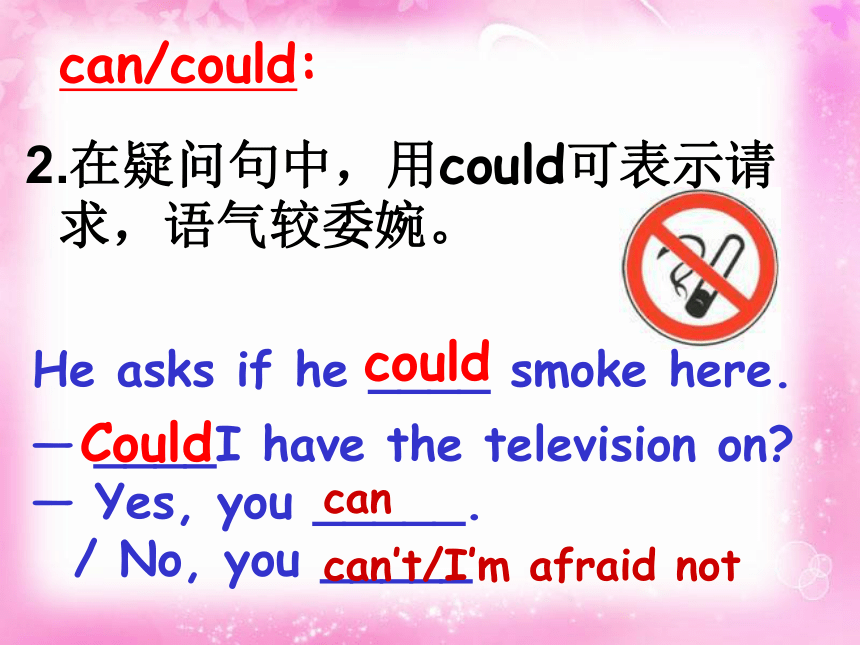

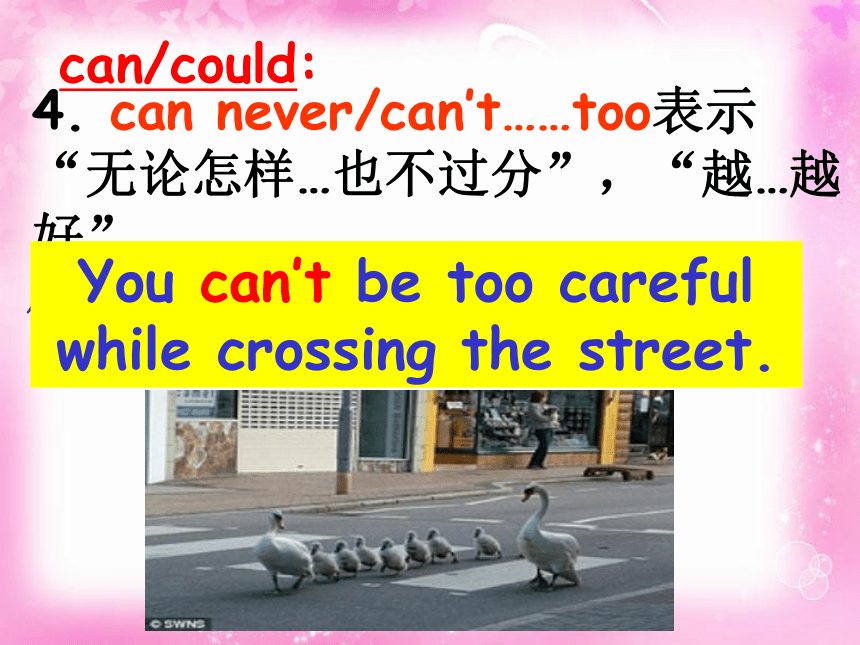
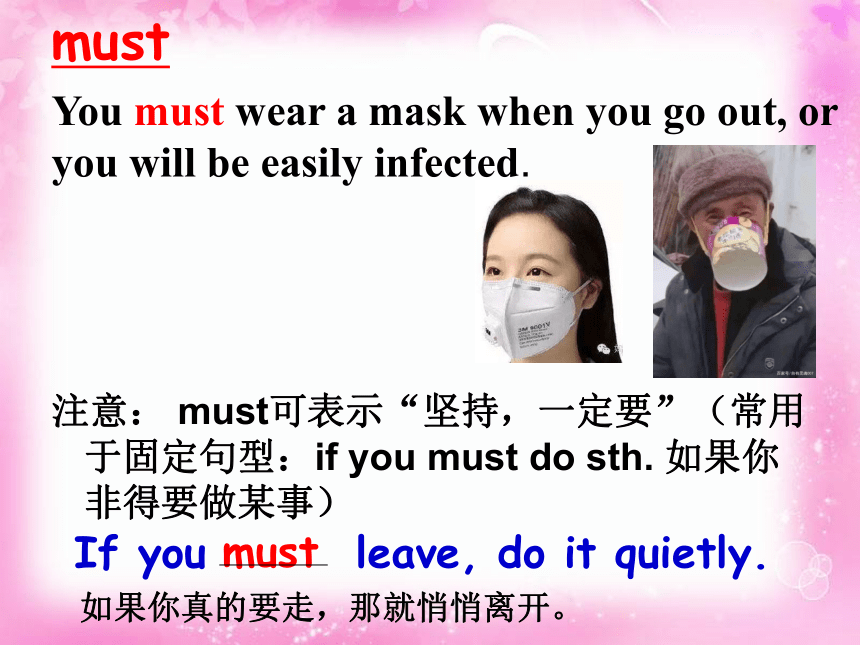
文档简介
1.Ability (能力):
I am confident that we can defeat the epidemic!
can/could:
1. can 表示能力或者一种客观可能性,还可以表示请求和允许 。
Learning English _____ be difficult.
can
_______ I use your computer?
Can
can/could:
2.在疑问句中,用could可表示请求,语气较委婉。
— ____I have the television on?
— Yes, you _____.
/ No, you _____
Could
He asks if he ____ smoke here.
could
can
can’t/I’m afraid not
can/could:
3.表示惊异、怀疑、不相信的态度。(主要用在否定句、疑问句或惊叹句中)
He’s such a nice person that he ______ commit the crime!
can’t
你怎么会如此地粗心!
How can you be so careless!
__________ this be true?
Can
can/could:
4. can never/can’t……too表示“无论怎样…也不过分”,“越…越好” 。
你过马路的时候再小心也不为过。
You can’t be too careful while crossing the street.
注意: must可表示“坚持,一定要”(常用于固定句型:if you must do sth. 如果你非得要做某事)
如果你真的要走,那就悄悄离开。
If you leave, do it quietly.
must
You must wear a mask when you go out, or you will be easily infected.
must
2.Certainty (可能性) :
Since the epidemic is not over, we may not start school until April.
1.He _____ be at home.(多选)
2.He _____ be at home, for he just called me from his home 15 seconds ago.
A.may B.might C.must
A.may B.might C.must
情态动词表示猜测是高考热点之一:
must>should>can>could>may>might(可能性)
3.Permission (允许):
shall:
1.Shall用于第一、第三人称疑问句中,表示说话人征求对方的意见、向对方请示或提供帮助 。
1.Shall we begin our lesson?
2.When shall he be allowed to leave hospital?
shall:
2.Shall用于第二、第三人称,表示说话人给对方命令、警告、允诺或威胁。
You shall fail if you don‘t work harder.
He shall be punished according to the rule.
等我读完这本书,就会给他的。
He shall have the book when I finish it.
警告
威胁
承诺
1.。。。
2. should表示意外或惊讶 常译为
“居然,竟然”。
I can’t believe such a gentleman should be so rude to the old.
我不敢相信这样一个绅士居然对老人如此无礼。
should:
must have done
can’t have done
could have done
should have done
ought to have done
needn’t have done
might/may have done
情态动词+have done:表示对过去发生的事进行推测
一定做了…
不可能做了…
本可以做但没做…
本该做,而没做…
本不必做,而做了…
可能做了…
本该做,而没做…
(1) It ______ be the postman at the door. It’s only six o’clock.
A. mustn’t B. can’t
C. won’t D. needn’t
B
能力提升:高考练兵场
(2) We ______ have bought so much food now that Lucy won't be with us for dinner.
may not B. can’t
C. needn't D. mustn't
C
(3) ---Did the train arrive in time?
----No. It _______ two hours ago.
A. must have arrived B. ought to have arrived
C. must arrive D. ought to arrive
(4) Must I drive to his house and pick up the
children?" ?
"No, ??????? ."
? A. you shouldn't? B. you might not ?
C. you needn't ? D. you mustn't
B
C
(1)你们不准在学校吸烟。
You mustn’t smoke at school.
(2)现在已是午夜了, 你偏要这个时候弹
钢琴吗?
It is midnight. _________________________?
Must you play the piano now
Translate the sentences
I am confident that we can defeat the epidemic!
can/could:
1. can 表示能力或者一种客观可能性,还可以表示请求和允许 。
Learning English _____ be difficult.
can
_______ I use your computer?
Can
can/could:
2.在疑问句中,用could可表示请求,语气较委婉。
— ____I have the television on?
— Yes, you _____.
/ No, you _____
Could
He asks if he ____ smoke here.
could
can
can’t/I’m afraid not
can/could:
3.表示惊异、怀疑、不相信的态度。(主要用在否定句、疑问句或惊叹句中)
He’s such a nice person that he ______ commit the crime!
can’t
你怎么会如此地粗心!
How can you be so careless!
__________ this be true?
Can
can/could:
4. can never/can’t……too表示“无论怎样…也不过分”,“越…越好” 。
你过马路的时候再小心也不为过。
You can’t be too careful while crossing the street.
注意: must可表示“坚持,一定要”(常用于固定句型:if you must do sth. 如果你非得要做某事)
如果你真的要走,那就悄悄离开。
If you leave, do it quietly.
must
You must wear a mask when you go out, or you will be easily infected.
must
2.Certainty (可能性) :
Since the epidemic is not over, we may not start school until April.
1.He _____ be at home.(多选)
2.He _____ be at home, for he just called me from his home 15 seconds ago.
A.may B.might C.must
A.may B.might C.must
情态动词表示猜测是高考热点之一:
must>should>can>could>may>might(可能性)
3.Permission (允许):
shall:
1.Shall用于第一、第三人称疑问句中,表示说话人征求对方的意见、向对方请示或提供帮助 。
1.Shall we begin our lesson?
2.When shall he be allowed to leave hospital?
shall:
2.Shall用于第二、第三人称,表示说话人给对方命令、警告、允诺或威胁。
You shall fail if you don‘t work harder.
He shall be punished according to the rule.
等我读完这本书,就会给他的。
He shall have the book when I finish it.
警告
威胁
承诺
1.。。。
2. should表示意外或惊讶 常译为
“居然,竟然”。
I can’t believe such a gentleman should be so rude to the old.
我不敢相信这样一个绅士居然对老人如此无礼。
should:
must have done
can’t have done
could have done
should have done
ought to have done
needn’t have done
might/may have done
情态动词+have done:表示对过去发生的事进行推测
一定做了…
不可能做了…
本可以做但没做…
本该做,而没做…
本不必做,而做了…
可能做了…
本该做,而没做…
(1) It ______ be the postman at the door. It’s only six o’clock.
A. mustn’t B. can’t
C. won’t D. needn’t
B
能力提升:高考练兵场
(2) We ______ have bought so much food now that Lucy won't be with us for dinner.
may not B. can’t
C. needn't D. mustn't
C
(3) ---Did the train arrive in time?
----No. It _______ two hours ago.
A. must have arrived B. ought to have arrived
C. must arrive D. ought to arrive
(4) Must I drive to his house and pick up the
children?" ?
"No, ??????? ."
? A. you shouldn't? B. you might not ?
C. you needn't ? D. you mustn't
B
C
(1)你们不准在学校吸烟。
You mustn’t smoke at school.
(2)现在已是午夜了, 你偏要这个时候弹
钢琴吗?
It is midnight. _________________________?
Must you play the piano now
Translate the sentences
同课章节目录
